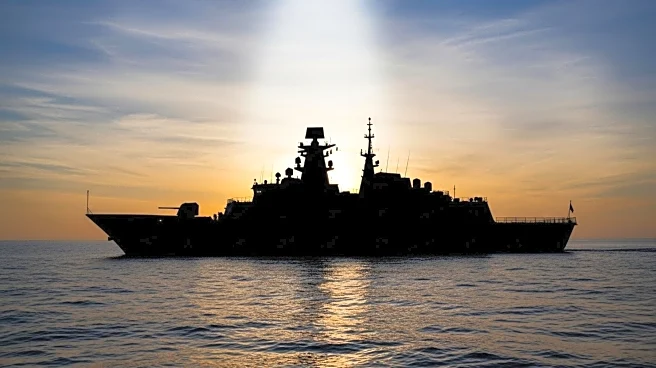What's Happening?
Taiwan's Republic of China Navy (RoCN) has announced a delay in its new light frigate program, originally scheduled to deliver the first vessels by late 2026. The delay, extending the timeline by two to three years, means the navy now expects to receive the first frigates by 2027-2028. The program, which includes the construction of 12 vessels, is divided into two variants: air-defense (AD) and anti-submarine warfare (ASW). The delay is reportedly due to challenges in acquiring necessary equipment for the vessels, although Taiwan's Ministry of National Defense has not officially commented on the reasons. The frigates are designed to enhance Taiwan's maritime surveillance, reconnaissance, and attack capabilities, with specifications including a length of 116 meters, a width of 15 meters, and a draught of 4.3 meters. They are expected to achieve speeds of 30 knots and have a range of 2,200 nautical miles.
Why It's Important?
The delay in Taiwan's light frigate program could have significant implications for the country's maritime defense strategy. These vessels are crucial for bolstering Taiwan's surveillance and reconnaissance capabilities in the region, particularly amid increasing geopolitical tensions. The postponement may affect Taiwan's ability to effectively monitor and respond to maritime threats, potentially impacting regional security dynamics. Additionally, the delay could influence Taiwan's defense procurement strategies and its relationships with international defense partners. The extended timeline may also affect the RoCN's operational readiness and its ability to maintain a technological edge in maritime defense.
What's Next?
As Taiwan navigates the delay in its frigate program, the RoCN may need to explore alternative strategies to maintain its maritime defense capabilities. This could involve accelerating other defense projects or seeking interim solutions to bridge the capability gap. The delay may prompt discussions within Taiwan's defense circles about procurement processes and the need for more efficient equipment acquisition strategies. Additionally, stakeholders in the region may closely monitor Taiwan's defense developments, potentially influencing diplomatic and military engagements.
Beyond the Headlines
The delay in Taiwan's frigate program highlights broader challenges in defense procurement and project management. It underscores the complexities involved in acquiring advanced military technology and the potential for unforeseen obstacles. This situation may lead to increased scrutiny of Taiwan's defense procurement processes and could trigger discussions on improving efficiency and transparency in military projects. Furthermore, the delay may have long-term implications for Taiwan's defense industry, affecting its ability to compete in the global defense market.









